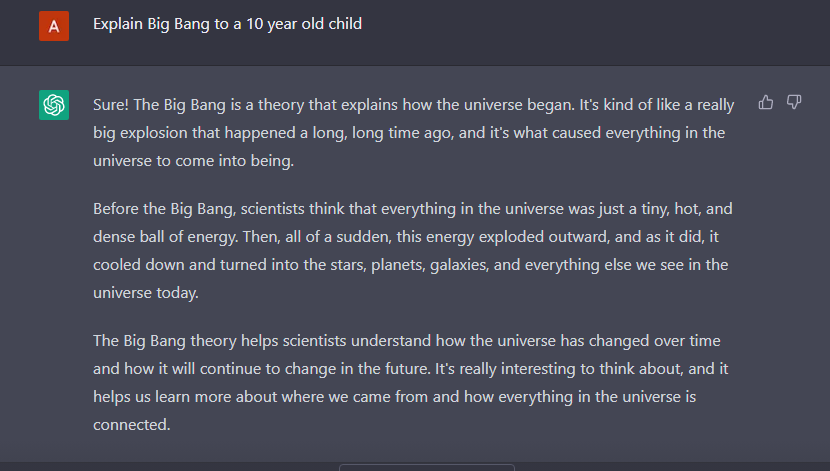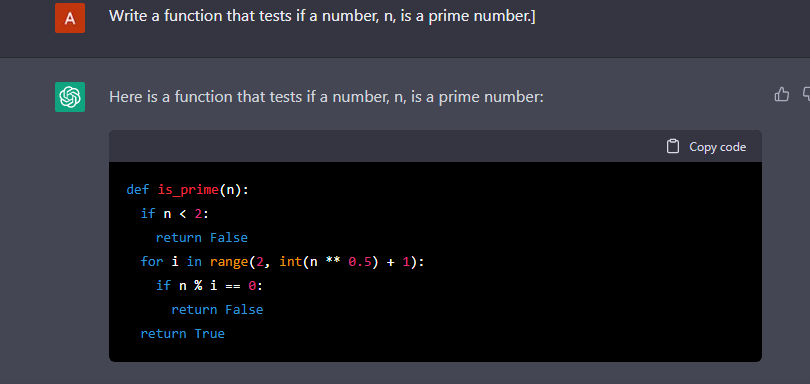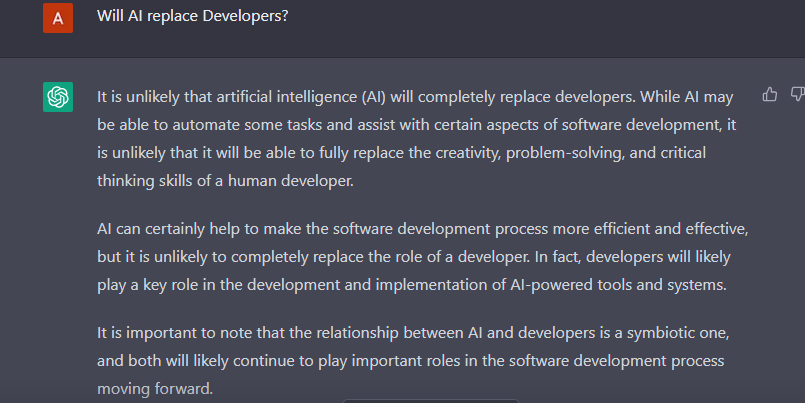
Artificial intelligence! It is a word that evokes different types of conspiracy theories and speculations, eliciting emotions of excitement and dread. Some want to explore and push the possibilities of what AI can do, while others want to proceed with caution.
It's a hot topic in which we witness fierce debates regarding how to proceed with this technology. The benefits are immense! No doubt about that! But what will be its cost? Take, for example, ChatGPT, a chatbot released by Open AI. People are already freaking out over the possibilities of what it can do, making some of them nervous regarding how it will affect their careers, especially software developers.
Will tools like ChatGPT replace developers and completely automate programming? Let's explore that in this blog.
Can AI Write Code on its own?
Yes! There are different ways through which AI can generate code.
Rule-Based Code Generation
It is a technique for generating code using a set of pre-defined rules. You can specify the structure and content of the code using these rules and the relationship between its different elements.
This technique is often used where the code being generated follows a predictable pattern or is based on a specific set of requirements.
For example, you want to code for a database schema. So, the rule-based code generator will generate the code based on the set of tables and columns defined by you.
Machine Learning
You can train machine learning algorithms through a collection of code. It can then generate new code based on that training.
The collection should include a variety of coding examples of a specific programming language you want to use for the AI. These samples should be diverse and cover various scenarios and programming concepts.
The data needs to be cleaned and preprocessed before using it to train the machine learning model. It involves removing unnecessary information, formatting the data in a specific way, or converting it into a form that machine learning finds suitable.
The model is trained on the preprocessed data by adjusting its parameters to reduce errors between its prediction and the actual code in the data set. A process like this is known as training the model. It involves using an optimized algorithm to adjust the model's parameters.
Once the training is complete, the machine learning model generates new code based on the patterns and structures it has learned from the training data. The entire training process involves providing the model with a set of inputs (for example, a description of what the code should do) and allowing it to generate the code based on those inputs.
Natural Language Processing
You can use AI to understand and interpret natural language instructions and generate code based on those instructions. One can use it to create code by describing what the code should do in plain English without having to write it in a programming language.
Here is how it works.
The first step involves converting natural language instructions into a machine-readable format. It involves using NLP algorithms to extract the meaning from the instructions and show them in a structured format.
After converting the instructions into a machine-readable format, they can be mapped to code using rules or templates. Once done, it generates an output in the desired programming language.
Everyone is talking about ChatGPT these days. Let’s look into what this chatbot is that has taken the internet by storm.
Suggested Reading: What Makes Python the Perfect Language for Software Development?
What Is ChatGPT?
ChatGPT is an AI that generates human-like text similar to chatbot conversations. It is based on the GPT (Generative pre-training transformer) and is a large language model trained on a text dataset. ChatGPT can generate natural language text almost similar to human-written one. Here is an example:

ChatGPT can be used in building chatbots that can engage in natural, human-like conversations with users. You can use it in various contexts, like customer services, providing specific information, and entertainment.
In the context of coding, ChatGPT cannot write code independently. Although, it is possible to use it in conjunction with other tools or techniques to facilitate the process of writing code.
For example, ChatGPT can generate natural language descriptions of what a piece of code should do, which could then be used as input for a code generation tool.
This code generation tool could then use these descriptions to generate actual code based on specific rules or templates.


There are several ways in which developers can use ChatGPT in their work.
Four Ways to Use ChatGPT as a Developer
Here are some of my suggestions for software engineers regarding how they can use ChatGPT.
- Generating code documentation: Developers can use ChatGPT to generate natural language documentation for code. It can explain how the code works and what it does.
- Generating code examples: ChatGPT can generate code examples that show how to use specific programming concepts or libraries. Such examples could help in learning or starting new projects.
- Generating code comments: You can use ChatGPT to generate code comments that explain the purpose and functionality of specific code sections. It can be beneficial for making code easier to understand and maintain.
- Facilitating code review: Generate natural language summaries of any changes in the code, which can be helpful during a review. You can also use it to generate suggestions for improving the code or identify potential issues.
ChatGPT can make writing and understanding code more efficient and effective.
But let's address the burning question in everyone's mind right now.
Will Developers Go Obsolete Due to AI Like ChatGPT?
At this stage, it's pure speculation over how AI will impact people's jobs. It's purely an opinion. Take it with a grain of salt over what I share here.

AI’s like ChatGPT will change the way people code. Developers might become more efficient as they will know what to ask for to solve a specific problem. This AI will save a lot of labor and syntax errors.
Problems might arise when building an app architecture and designing systems and how they interact—gathering the requirements and deciding the tradeoff. It's not that you give the X requirements, and ChatGPT will produce a solution.
ChatGPT is more of a search engine right now. Ask any question/prompt, and it will share a meaningful answer. It is limited by the collection of what exists at this point. So, ChatGPT can solve problems it's likely encountered before and synthesize text in the style of something. But that's where it ends.
People who know programming will understand how to get the correct answer from ChatGPT because they are good at describing problems that AI can solve. Not everyone will be able to do it.
The output of ChatGPT will depend on how good your prompt and AI are, and complicated problems will require correct prompts.
It can also lead to Jevons Paradox.

Suggested Reading: Remarkable Ways AI and Blockchain Are Transforming the Future
AI and Programming Developers: Forging A Symbiotic Relationship
Machine learning algorithms can analyze code and identify patterns and defects, making it easier for programmers to write and maintain high-quality code.
Here is an example:
A software development company wanted to improve the efficiency and accuracy of its code review process. They used a machine learning algorithm to analyze their codebase and identify defects.
To train the algorithm, the company provided it with a large dataset of code that had been manually reviewed and labeled as either defective or non-defective.
The algorithm learned from this dataset and could accurately predict whether new pieces of code were defective.
The company then integrated the machine learning model into its code review process.
Whenever a programmer submitted a piece of code for review, the model would analyze it and provide a prediction of whether it was likely to contain defects.
It helped the reviewers identify potential issues more quickly and accurately.
This example shows the benefits of using AI and machine learning in software development.
AI, too, will gain a lot from developers in return. Here are some examples.
- Improved Performance
Developers can write code to make the AI systems perform their tasks more efficiently and accurately. There are several ways to do this.
First, it could be identifying and addressing bottlenecks or inefficiencies in code. It will optimize the algorithms that the AI systems use in performing tasks. Thus, the AI will process data more quickly and accurately.
- Provide high-quality training data
The AI will learn more effectively and have better accuracy when the developers provide high-quality training data for it to learn.
- Implementing error correction
Developers can implement error correction mechanisms to help AI identify errors and correct them in its output, improving its accuracy when displaying results.
- Fine-tuning hyperparameters
To optimize the AI's performance, developers can fine-tune the hyperparameters. These parameters get set before training the AI model. Thus, optimizing them will help the AI learn more effectively with better accuracy.
By leveraging the insights and capabilities these technologies provide, software developers can improve the efficiency and accuracy of their work, leading to better software and happier customers.
Suggested Reading: Are You Keeping Up With the Emerging Trends in Software Testing?
A Misplaced Fear
Artificial Intelligence will not replace developers. It will further complement their work. AI's like ChatGPT are designed to assist with specific tasks when you write a prompt. But it might not have the same creativity and problem-solving skills as humans have.
Developers play a crucial role when designing software and maintaining it. AI cannot match the expertise and nuances developers bring to the table. Solving unique challenges that each project presents to deciding the tradeoffs, only human developers can understand and address these. It is not possible for an AI.
Not every task can be automated! Communicating with clients, establishing a consensus with team members, understanding the business needs and how to meet them, and adapting to the changing requirements. Can AI do all of these? Probably not.
So, AI can be a valuable tool for developers. But it won't be their substitution. Developers will continue to be at the helm of software programming.
